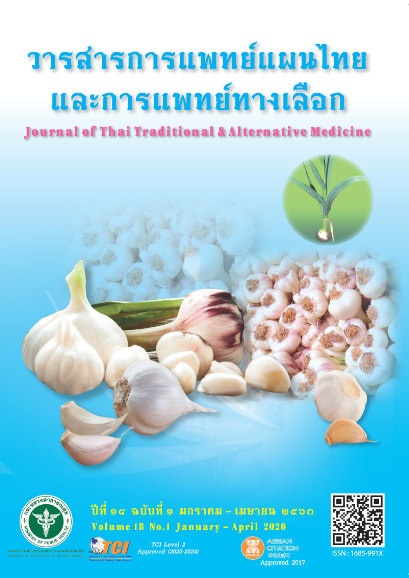Situation of Public and Private Herbal Pharmaceutical Factories in Thailand
Main Article Content
Abstract
BACKGROUND: The usage of Thai traditional or herbal drugs or medicines in the country has not been increasing as anticipated although there is a demand-driven herbal use policy. Given the lack of evidence of the supply side of Thai herbal medicines, this study aims to explore the number, distribution and quality of private and state-owned herbal pharmaceutical factories of Thailand. METHODS: An analysis of secondary data on herbal pharmaceutical factories during June–December 2017 from (1) the Department of Thai Traditional and Alternative Medicine, (2) the Thai Food and Drug Administration and (3) the Health Data Center (HDC) of the Ministry of Public Health was conducted, using descriptive statistics and spatial analyses. RESULTS: As of December 2017, there were 71 public and 947 private herbal pharmaceutical factories in Thailand. When considering the quality of such manufacturers, 32 factories (45.07%) in government hospitals met the WHO GMP standards, but only 36 private factories (3.80%) met the GMP PIC/s (Good Manufacturing Practice, Pharmaceutical Inspection Co-operation Scheme) standards. The state-owned factories were actually located in government hospitals scattered in all 12 Health Regions of the country, mostly in Regions 7, 9, 10 and 12, but the private factories were mostly located in Bangkok and its periphery. CONCLUSION: The number of government herbal pharmaceutical factories was smaller than that in the private sector. In terms of quality requirements, the public and private factories used different GMP production standards. Thus, different production costs occurred and caused controversies over the use of such different standards. Hence, there should be an analysis of production standards and costs in both public and private sector factories. A suitable number of state herbal pharmaceutical factories should also be reviewed and established for each health region so that larger quantities of such drugs can be produced, based on the economy of scale and cost-cutting approaches. Moreover, public-private sector cooperation among such factories should be promoted in a systematic manner.
Article Details
References
Office of the National Economic and Social Development Board. Tenth National Economic and Social Development Plan B.E. 2550–2554 (A.D. 2007–2011). Bangkok: Office of the Prime Minister; 2007. 180 p. (in Thai)
Department of Thai Traditional and Alternative Medicine, Ministry of Public Health. National Master Plan for the development of Thai herbs No.1, B.E. 2560-2564
(A.D. 2017-2021). Ministry of Public Health. 2nd ed. Nonthaburi: TS Interprint; 2016. 216 p. (in Thai)
Bureau of Drug Control, Food and Drug Administration. Licensee statistics of manufacturers, importers, distributors and drugstores [Internet]. [cited 2017 December 20]; Available from: https://www.fda.moph.go.th/sites/drug/Shared%20Documents/Statistic/Licensee-20180228.pdf (in Thai)
Ministry of Public Health. Health data center [Internet]. [cited 2017 December 20]. Available from: https://hdcservice.moph.go.th (in Thai)
Drugs Act, B.E. 2510: Government Gazette; 1967. (in Thai)
Soonthorncharoennon N, Paonil W, Prathanturarug S, Soonthorncharoennon W. Knowledge creation and management: future developement Thai herbal industry. Health System Research Institute (HSRI); 2006. (in Thai)
Limsajakula J. Factors for Thai herbal medicinal products development. King Prajadhipok’s Institute; 2010. (in Thai)
Office of Small and Medium Enterprises Promotion, Economic Research and Training Center, Faculty of Economics, Thammasat University. Importance and
structure of herbal and pharmaceutical industry. In Strategic and Operational plan on Thai herbal products promotion for SME.; 2015. p. 3-12, 3-14. (in Thai)
Vadhnapijyakul A, Suttipanta N. The promotion of Thai traditional medicine policy in government hospitals: myth or reality. Isan Journal of Pharmaceutical Sciences. 2014;9(Suppl):149-54. (in Thai)
National List of Essential Medicines Development Subcommittee. Manual of manufacturing and quality assurance for hospital pharmacopeia from herb in national list of essential medicines B.E. 2555. Bangkok: Bureau of Drug Control, Food and Drug Administration, Ministry of Public Health; 2013. (in Thai)
Pansuwan C, Thaosuwan T, Pladisai N. Financial model development for hospital-based traditional medicine production (dissertation). Phamaceutical Sciences.
Bangkok: Chulalongkorn University; 2018. (in Thai)


